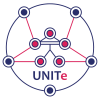Sofia University Features ILEDA and ISILA Projects for Advancing Online and Blended Learning
The Scientific Research Department at Sofia University has introduced a new initiative aimed at showcasing exceptional research efforts through a series of short promotional videos We are pleased that the ILEDA project, together with its follow-up initiative ISILA – supported by COE UNITe — has been selected as part of this year’s featured projects.The video […]
The 9th IEEE International Conference Big Data, Knowledge and ControlSystems Engineering (BdKCSE 2025) took place in Bankya
The 9th IEEE International Conference Big Data, Knowledge and ControlSystems Engineering (BdKCSE 2025) took place in Bankya on November 6, 2025.Ivan Lambov, Ph.D. (UNITe; Institute of Mathematics and Informatics,Bulgarian Academy of Sciences) and Tsvetomir Gospodinov (doctoral studentat the Faculty of Mathematics and Informatics, Sofia University)participated with a research paper titled “The Use of Blockchain to SecureIoT […]
A teacher seminar at FMI of SU, dedicated to artificial intelligence in education, sparked widespread interest and lively discussions
On November 6, 2025, a seminar on “Good practices and challenges in the use of artificial intelligence in mathematics and computer science education in secondary education” was held in the conference hall of the Center of Excellence UNITe at the Sofia University “St. Kliment Ohridski”. The forum was organized by the Faculty of Mathematics and […]
UNITe was presented on a scientific seminar in Velingrad
Between October 17 and 19, 2025, a scientific seminar on “Good practices for the application of high-tech tools in mathematics, informatics, and IT education” was held in Velingrad, organized by the IT Department of FMI, SU. Researchers from the Center for Excellence UNITe (CoE) presented some of the challenges and opportunities arising from the application […]
Invitation: CoE UNITe will be presented at the national meeting “From Science to Innovation”
CoE UNITe is pleased to invite all interested partners and friends on November 4, 2025, to the John Atanasov Hall at Sofia Tech Park, Sofia, for the national meeting “From Science to Innovation.” During the plenary sessions, Prof. Plamen Zahariev from UNITe/ Angel Kanchev University of Ruse will present some of the UNITe CoE initiatives. […]
COE UNITe Association is hiring LEADING RESEARCHER(R4)
The Center of Excellence UNITe is an association, established by leading Bulgarian universities with a clear mission: to advance scientific knowledge, innovation, and digital transformation in Bulgaria. UNITe brings together the academic community to conduct high-quality research, develop technologies and share knowledge within an e-society. MAIN RESPONSIBILITIES REQUIREMENTS If you are interested in the […]
COE UNITe Association is hiring INTELLECTUAL PROPERTY EXPERT
The Center of Excellence UNITe is an association, established by leading Bulgarian universities with a clear mission: to advance scientific knowledge, innovation, and digital transformation in Bulgaria. UNITe brings together the academic community to conduct high-quality research, develop technologies and share knowledge within an e-society. MAIN RESPONSIBILITIES REQUIREMENTS If you are interested in the […]
COE UNITe Association is hiring RECOGNIZED RESEARCHER (R2)
The Center of Excellence UNITe is an association, established by leading Bulgarian universities with a clear mission: to advance scientific knowledge, innovation, and digital transformation in Bulgaria. UNITe brings together the academic community to conduct high-quality research, develop technologies and share knowledge within an e-society. MAIN RESPONSIBILITIES REQUIREMENTS If you are interested in the […]
IBM Quantum – a jump into the new era of quantum processors
A second meeting with IBM’s business team took place on September 3, 2025, again at the UNIT building, this time focusing on quantum programming. The materials were presented by Dafinka Lazarova and Emil Melamed, and among the attendees were Prof. Krassen Stefanov, Prof. Vladimir Dimitrov, Assoc. Prof. Alexander Dimov, and Senior Assistant Prof. Dafinka Miteva, […]
IBM Watsonx – the intelligent partner in scientific research
On September 1, 2025, a scientific meeting was held at the UNITe building on 5 James Bouchier Boulevard with representatives and experts from IBM on the topic of Watsonx – a platform of IBM for artificial intelligence and data The platform was designed to help organizations develop, train, manage, and implement generative and traditional AI […]
